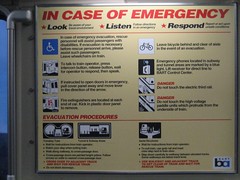 Image by mikebaird via Flickr
Image by mikebaird via Flickr
Tonight, I'm doing something different. I'm talking about increasing your earning potential And I'm telling you two personal stories to get the message across.
Take it from me. Do yourself a huge favor and sign up for a class. I heard that collective "Aargh!" :) No, you don't have to go back to school and read tons of books (although that's one of my favorite activities). What I am recommending is taking one of your personal favorite activities - could be a hobby or an interest - and getting some structured skill development in that area.
Let me tell you what I have done. I've decided to get serious about my hobbies. I've decided to do my own research, practice what I learn, and seek technical training in formal settings. A class is a great way to make new friends with like minded people with similar interests, and also learn a lot of information in an effective way.
I'm investing in myself and having a ball doing so by turning a hobby into an potential source of income.
Try it. It doesn't have to take up all your time, or replace your main source of income, but in these days of uncertainty, diversifying your skill set is a wise move.
Invest in yourself, it's worth it.Which hobbies did I get serious about? Well, first, I decided to get serious about photography. What does this have to do with earning potential? Everything. As it turns out, there are tons of opportunities, especially now with the World Wide Web, to earn a bit of extra income from photography. With a bit of research you can match your interest with a willing market of buyers. Don't believe me? Well, there's stock photos, there's submissions to local newspapers, there's also work as art etc. I went to a great exhibition last Sunday - Just Photographs - and
WOW what amazing work by professionals. And some nice prices for the work too. I'm taking a class now and loving every second of it. I have learned so much from my classmates and my instructor. And I have met people who I share a common interest with. It's been awesome!
Second, I decided to get serious about blogging. What does this have to do with earning potential? Everything. I've been blogging since late last year. I've moved from one blog to two blogs. I blog everyday now. I do tons of research on how to blog, best practices, and how to increase earning potential from blogging. It started as an vehicle of expression - I'm pretty opinionated if you couldn't tell :) But then I started these personal finance experiments to help others in this economic downturn. I knew my readers are looking for ways to earn more money. So when I learned that people make money from blogging, I've tried some of the monetization techniques to see if they work so I can tell my readers how to do it. It's just some ads, really. But there's a whole skill to doing just that effectively. If I get it right, I'll be sure to share.
Blogging - with or without monetization - is actually a real skill and a very hot trend. I can use blogging in my full time job, or call upon that skill one day if I wish to to earn some additional income. So, taking my own advice, I took a one day seminar today and learned a ton! Not only am I investing in myself, I'm doing something fun, I am making new friends who have similar interests. If you like writing and knowledge sharing, and you are comfortable with the Internet, social media and cyberspace, you might want to try this.
But hey, those are just my examples of how I am taking my hobbies and turning them into the potential to be much more.
What do you like to do? Teach? Write? Name it.
Who knows, not only will you be
happier if you do more of those things that you like to do, t
hey may just help to pay the bills! :)
 Image by Steve Wampler via Flickr
Image by Steve Wampler via Flickr


![Reblog this post [with Zemanta]](http://img.zemanta.com/reblog_e.png?x-id=1a29fc89-4849-4f07-a06a-dbe32f95138d)


![Reblog this post [with Zemanta]](http://img.zemanta.com/reblog_e.png?x-id=b5b1a900-0146-44da-8d34-f17936afc4c0)

![Reblog this post [with Zemanta]](http://img.zemanta.com/reblog_e.png?x-id=40af133e-3675-451f-bd58-2c28ff609864)

![Reblog this post [with Zemanta]](http://img.zemanta.com/reblog_e.png?x-id=92d3634c-fb93-462c-91ad-8add9d74d75c)

![Reblog this post [with Zemanta]](http://img.zemanta.com/reblog_e.png?x-id=8baec033-fd31-4001-8d9c-671a54008f93)

![Reblog this post [with Zemanta]](http://img.zemanta.com/reblog_e.png?x-id=15021f4c-50c9-4a97-b9b4-e125562bad74)

![Reblog this post [with Zemanta]](http://img.zemanta.com/reblog_e.png?x-id=3dbcba8a-847d-4fec-93b3-00f9eac80403)
![Reblog this post [with Zemanta]](http://img.zemanta.com/reblog_e.png?x-id=4fee3511-bf14-4273-9976-009d826c0dfe)

![Reblog this post [with Zemanta]](http://img.zemanta.com/reblog_e.png?x-id=d4d86649-2789-4f2a-8714-d507db0170f9)

![Reblog this post [with Zemanta]](http://img.zemanta.com/reblog_e.png?x-id=ae1c9ae7-d2d6-4a6a-84e0-b9dcee4b4f6e)

![Reblog this post [with Zemanta]](http://img.zemanta.com/reblog_e.png?x-id=594e43f6-a40a-4013-b767-19b13d9fdd85)

![Reblog this post [with Zemanta]](http://img.zemanta.com/reblog_e.png?x-id=4a1ff46c-de32-4d41-a4a2-59ea419d2562)

![Reblog this post [with Zemanta]](http://img.zemanta.com/reblog_e.png?x-id=0d89abdb-21bd-46db-8326-4c292a922cc2)
![Reblog this post [with Zemanta]](http://img.zemanta.com/reblog_e.png?x-id=2acc1074-6ee2-4552-a1e5-26a4f4f0ea7b)

![Reblog this post [with Zemanta]](http://img.zemanta.com/reblog_e.png?x-id=704be9ba-7d16-4382-abd4-f476e6afb541)

![Reblog this post [with Zemanta]](http://img.zemanta.com/reblog_e.png?x-id=9306fb27-3b16-4ff4-9a2e-b9a011dd0c47)

![Reblog this post [with Zemanta]](http://img.zemanta.com/reblog_e.png?x-id=1fc4c1a6-154c-4cfe-876c-92610838e8a9)

![Reblog this post [with Zemanta]](http://img.zemanta.com/reblog_e.png?x-id=5e644bfe-3e08-48c5-8fa0-26e7f9eb9bde)

![Reblog this post [with Zemanta]](http://img.zemanta.com/reblog_e.png?x-id=09d6cac3-cc1a-4e8e-8c76-e5456bb69fb4)

![Reblog this post [with Zemanta]](http://img.zemanta.com/reblog_e.png?x-id=279d7cf0-eab1-493d-9bce-67705f1b2afb)

![Reblog this post [with Zemanta]](http://img.zemanta.com/reblog_e.png?x-id=d4d29d5d-6bd8-4db3-abc3-c3f9bf4ffd1b)

![Reblog this post [with Zemanta]](http://img.zemanta.com/reblog_e.png?x-id=9785579b-3926-4d77-8ba2-88419b49a608)

![Reblog this post [with Zemanta]](http://img.zemanta.com/reblog_e.png?x-id=1e5f4023-8f8e-4d14-82e6-bfc14a2386ff)

![Reblog this post [with Zemanta]](http://img.zemanta.com/reblog_e.png?x-id=c8718153-ec0d-4356-9207-0d0246085315)

![Reblog this post [with Zemanta]](http://img.zemanta.com/reblog_e.png?x-id=d19c163b-8bd9-4c5d-9db5-22d7ed5ca0ac)

![Reblog this post [with Zemanta]](http://img.zemanta.com/reblog_e.png?x-id=2d170544-5064-4045-b7f5-5f43caa14689)








